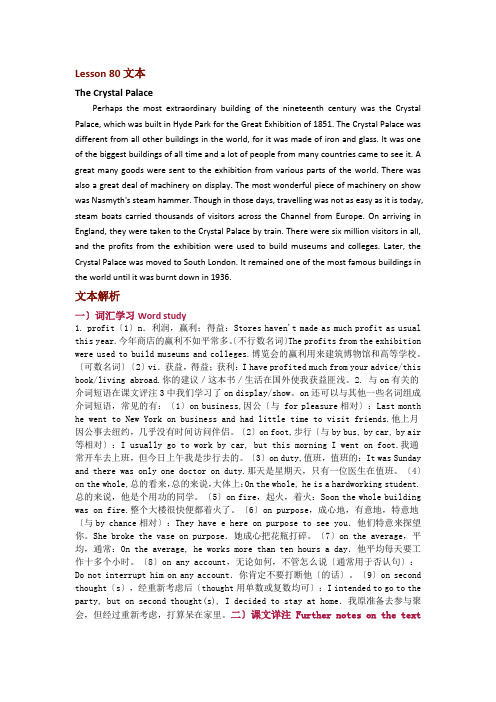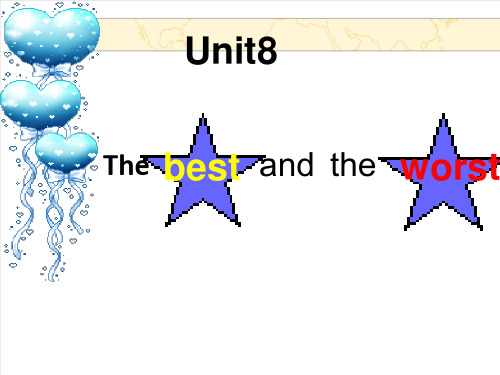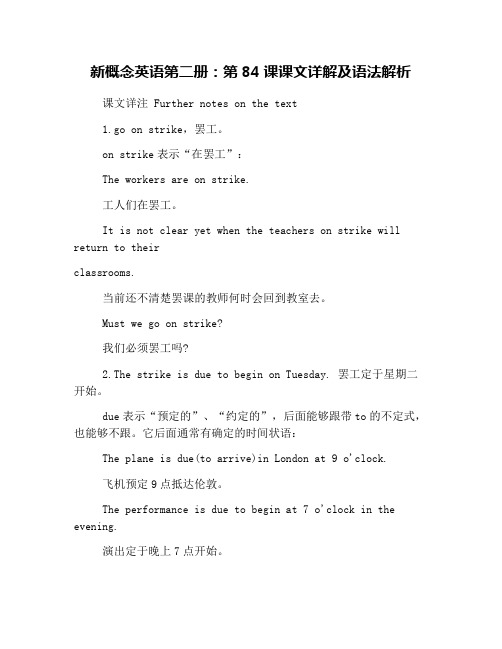新概念英语第二册:第8课课文详解及语法解析
新概念第二册Lesson88Trappedinamine课文详解重点词汇语法语法填空讲义(1)

Lesson 88 文本Trapped in a mineSix men have been trapped in a mine for seventeen hours. If they are not brought to the surface soon they may lose their lives. However, rescue operations are proving difficult. If explosives are used, vibrations will cause the roof of the mine to collapse. Rescue workers are therefore drilling a hole on the north side of the mine. They intend to bring the men up in a special capsule. If there had not been a hard layer of rock beneath the soil, they would have pleted the job in a few hours. As it is, they have been drilling for sixteen hours and they still have a long way to go. Meanwhile, a microphone, which was lowered into the mine two hours ago, has enabled the men to keep in touch with the closest relatives. Though they are running out of food and drink, the men are cheerful and confident that they will get out soon. They have been told that rescue operations are progressing smoothly. If they knew how difficult it was to drill through the hard rock, they would lose heart.文本解析一〕词汇学习Word study1. collapse vi.〔1〕倒塌:If explosives are used, vibrations will cause the roof of the mine to collapse.假设用炸药爆破,震惊会引起矿顶塌落。
新概念第二册Lesson80Thecrystalpalace课文详解重点词汇语法语法填空讲义

Lesson 80 文本The Crystal PalacePerhaps the most extraordinary building of the nineteenth century was the Crystal Palace, which was built in Hyde Park for the Great Exhibition of 1851. The Crystal Palace was different from all other buildings in the world, for it was made of iron and glass. It was one of the biggest buildings of all time and a lot of people from many countries came to see it. A great many goods were sent to the exhibition from various parts of the world. There was also a great deal of machinery on display. The most wonderful piece of machinery on show was Nasmyth's steam hammer. Though in those days, travelling was not as easy as it is today, steam boats carried thousands of visitors across the Channel from Europe. On arriving in England, they were taken to the Crystal Palace by train. There were six million visitors in all, and the profits from the exhibition were used to build museums and colleges. Later, the Crystal Palace was moved to South London. It remained one of the most famous buildings in the world until it was burnt down in 1936.文本解析一〕词汇学习Word study1. profit〔1〕n.利润,赢利;得益:Stores haven't made as much profit as usual〔不行数名词〕The profits from the exhibition this year.今年商店的赢利不如平常多。
新概念二册第8课详解

• How many students entered for the competition?
• win(won,won) v. 赢 • ① vi. 赢 I won. • ② vt. 赢得…… • win something 后面往往是奖品,
• Nearly everybody enters for 'The Nicest Garden Competition' each year, but Joe wins every time.
• nearly和almost意义相似,表示“几乎”、 “差不多”、“差点儿”
• I have nearly forgotten his name. • 我差点把他的名字忘了。 • 我快准备好了。
• 这件裙子是你自己做的吗?
• Have you made the skirt by yourself? • 而build主要限于建筑业,指“建造,建设,盖房子,
修筑(桥梁)等” • 他们沿着河修了条路。 • They have made a road along the river.
• I like gardens too, but I do not like hard work. Every year I enter for the garden competition too, and I always win a little prize for the worst garden in the town!
不能接对手 • 赢得了一个奖
• win a prize • beat+sb • Tom beat peter.
新概念英语第二册 Lesson 8

1) 一般在词尾加er或est
2) 以字母e结尾的词,加r 或st
单音节 词和少 数多音 节词
3) 重读闭音节词以一个元 音字母和一个辅音字母结 尾,先双写辅音字母;再 加er或est
4) 以“辅音字母+y”结尾的 双音节词,先改“y”为 “i”,再加er或est
cold fast nice large big hot easy early tired
make和build在这里是同义词,“修建,建造”。 make的词义比较笼统、广泛,可解释为“做、作出、制造”等 Have you made the skirt by yourself? They have made a road along the river. build主要限于建筑业,指“建造,建设,盖房子,修筑(桥梁)等”
Review
几个小时之前 拿出来 充满 期待某人做... 贵重的礼物 珍贵的礼物 装有钻石的包裹 令某人惊讶的是...
2018/5/8
a few hours earlier take off be full of expect sb to do sth a valuable present a precious present a parcel of diamonds to one's surprise
funny
funnier
the funniest
Geyou is funny. Zhao Benshan is funnier than Geyou (is). Pan Changjiang is the funniest of them .
1) 规则变化
1. 形容词和副词• • • • • • • • • •
• • • •
新概念英语第二册课文详解

新概念英语第二册课文详解新概念英语第二册课文详解课文详注一FurthernotesonthetextstweekIwenttothetheatre.上星期我去看戏。
(1)句首的“Lastweek”点明叙述的事情发生的时间是上星期。
因此整篇课文的时态基本上应是过去时(包括过去进行时),直接引语部分的时态除外。
(2)动词go的原义是离开一个地方去另一个地方,与介词to连用后,常加上主语所要去的目的地来代表主语的动作目的。
课文中gotothetheatre=gotothetheatretoseeaplay,即去剧场看戏。
类似的还有gotothecinema=gotothecinematoseeafilm(去电影院看电影)。
这种表达方式简明扼要。
请注意在以下的短语中名词前通常不加冠词:gotoschool上学gotobed上床睡觉gotochurch上教堂,去做礼拜(cf.第1册第68课atschool,atchurch;第1册第85课havebeentoschool/church)2.hadaverygoodseat座位很好seat一般指戏院、汽车等配置的固定座位,也可以抽象地表示“座位”或“位子”的概念:thefrontseatofacar汽车的前座Takeaseat,please.请坐。
3.Theplaywasveryinteresting.戏很有意思。
interesting属于现在分词形式的形容词,意思是“使人感兴趣”。
它通常与非人称主语连用或修饰某个事物:Thisisaninterestingbook/idea.这是一本有趣的书/一个令人感兴趣的主意。
4.…weresittingbehindme.Theyweretalkingloudly.……坐在我的身后,大声地说着话。
这两句的时态为过去进行时。
(cf.第7课语法)5.Igotveryangry.我变得非常生气。
get在这里有“逐渐变得”的含义,接近become,是个表示过程的动词,表示状态的变化。
新概念英语第二册:第84课课文详解及语法解析

新概念英语第二册:第84课课文详解及语法解析课文详注 Further notes on the text1.go on strike,罢工。
on strike表示“在罢工”:The workers are on strike.工人们在罢工。
It is not clear yet when the teachers on strike will return to theirclassrooms.当前还不清楚罢课的教师何时会回到教室去。
Must we go on strike?我们必须罢工吗?2.The strike is due to begin on Tuesday. 罢工定于星期二开始。
due表示“预定的”、“约定的”,后面能够跟带to的不定式,也能够不跟。
它后面通常有确定的时间状语:The plane is due(to arrive)in London at 9 o'clock.飞机预定9点抵达伦敦。
The performance is due to begin at 7 o'clock in the evening.演出定于晚上7点开始。
due to后面若是名词,则它表示“因为”、“因为”(通常用于系动词be之后):Our delay was due to the heavy traffic.我们被耽搁了是因为交通拥挤。
3.…the strike will continue until general agreement is reached about payand working conditions.……此次罢工将一直持续到就工资和工作条件问题达成全面协议的时候为止。
在until引导的时间状语从句中,主语agreement的定语about pay and workingconditions被谓语隔开了。
因为谓语很短,如果定语紧跟agreement,则句子读起来会头重脚轻。
新概念英语第二册第八课笔记整理

新概念英语第二册第八课笔记整理摘要:I.引言- 介绍新概念英语第二册第八课的内容II.课文概述- 描述课文的主要内容- 介绍课文中的新单词和短语III.重点语法解析- 讲解课文中出现的重点语法- 给出例句帮助理解IV.学习技巧与方法- 分享学习英语的有效方法- 介绍如何提高英语听说读写能力V.总结- 总结本课的重要知识点- 鼓励读者多加练习,提高英语水平正文:新概念英语第二册第八课笔记整理新概念英语第二册第八课主要讲述了一个人在机场等待朋友的过程中,发生的一系列误会。
通过课文的学习,我们可以了解到机场的常用英语表达,以及如何用英语描述等待、期盼的心情。
同时,课文中也出现了一些重点语法,如一般现在时、现在进行时和一般过去时等。
课文概述:故事发生在一个机场,主要角色有一个人(A)和他的朋友(B)。
A在机场等待B,但B因为航班延误而迟迟未到。
A在等待过程中遇到了一些困难,如行李丢失、钱包被盗等。
最后,A和B终于见面,一起离开了机场。
重点单词和短语:1.airport(机场)2.terminal(候机厅)3.luggage(行李)4.wallet(钱包)5.delay(延误)6.customs(海关)7.boarding pass(登机牌)重点语法解析:1.一般现在时:用于描述事实、习惯或普遍真理。
例如:I usually wait for my friend at the airport.(我通常在机场等我的朋友。
)2.现在进行时:表示目前正在进行的动作。
例如:I am waiting for my friend.(我正在等我的朋友。
)3.一般过去时:表示过去某个特定时间发生的动作。
例如:I waited for my friend at the airport yesterday.(昨天我在机场等我的朋友。
)学习技巧与方法:1.多听、多说、多读、多写:提高英语能力的关键是多加练习。
可以尝试用英语描述日常生活中发生的事情,从而提高英语口语和写作能力。
新概念第二册Lesson81Escape课文详解重点词汇语法语法填空讲义

Lesson 81 文本EscapeWhen he had killed the guard, the prisoner of war quickly dragged him into the bushes. Working rapidly in the darkness, he soon changed into the dead man's clothes. Now, dressed in a blue uniform and with a rifle over his shoulder, the prisoner marched boldly up and down in front of the camp. He could hear shouting in the camp itself. Lights were blazing and men were running here and there: they had just discovered that a prisoner had escaped. At that moment, a large black car with four officers inside it, stopped at the camp gates. The officers got out and the prisoner stood to attention and saluted as they passed. When they had gone, the driver of the car came towards him. The man obviously wanted to talk. He was rather elderly with grey hair and clear blue eyes. The prisoner felt sorry for him, but there was nothing else he could do. As the man came near, the prisoner knocked him to the ground with a sharp blow. Then, jumping into the car, he drove off as quickly as he could.文本解析一〕词汇学习Word study1. cloth, clothes与clothing〔1〕cloth 通常指“布〞、“布料〞,为不行数名词:There's enough cloth for a skirt.那布料够做一条裙子。
- 1、下载文档前请自行甄别文档内容的完整性,平台不提供额外的编辑、内容补充、找答案等附加服务。
- 2、"仅部分预览"的文档,不可在线预览部分如存在完整性等问题,可反馈申请退款(可完整预览的文档不适用该条件!)。
- 3、如文档侵犯您的权益,请联系客服反馈,我们会尽快为您处理(人工客服工作时间:9:00-18:30)。
新概念英语第二册:第8课课文详解及语法解析
课文详注 Further notes on the text
1.Nearly everybody enters for 'The Nicest Garden Competition' each year, but Joe wins every time. 几乎每个人都参加每年举办的“花园竞赛”,而每次都是乔获胜。
(1)nearly和almost 意义相似,表示“几乎”、“差不多”、“差点儿”的意思:
I'm nearly/ almost ready.
我快准备好了。
I have nearly forgotten his name.
我差点把他的名字忘了。
He nearly missed the train.
他差点没赶上火车。
(2)each和every均可译为“每一个”,二者常常可以互相代替使用:
Every/ Each time I wash the car it rains.
每次我擦洗汽车,天总是下雨。
但是each更强调个体。
它常用以指一个确定的并通常是有限的数目:
Each child in the school was questioned.
学校里的每个孩子都被询问过了。
every却不那么强调个体,常用来指一个大的、不确定的数目:
Every child enjoys Christmas.
所有的/每个孩子都喜欢过圣诞节。
另外,each既可以作形容词又可以作代词,但every只能作形容词:
They each have a share.
他们每人都有一份。
Each of us has his own work to do.
我们每个人都有自己的工作要干。
2.Bill Frith's garden is larger than Joe's. 比尔·弗里斯的花园比乔的花园大。
名词加-'s表示所属关系,构成名词的所有格。
这类名词往往指有生命的东西,特别是人。
所有格的语法作用相当于形容词,限定后面的名词。
这个被限定的名词在上下文中第二次被提到时可以省略,只要不引起误解:
This is Mary's boy friend, not Jane's.
这是玛丽的男朋友,不是简的。
My pen is lost. This one is my brother's.
我的钢笔丢了。
这枝是我兄弟的。
John's handwriting is better than Mary's and Catherine's.
约翰的书法比玛丽的和凯瑟琳的都要好。
3.He has made neat paths and has built a wooden bridge over a pool. 他修筑了一条条整洁的小路,并在一个池塘上架了一座小木桥。
make和build在这里是同义词,都可以解释为“修建”、“建造”。
与汉语的写作习惯一样,用英语写作时同一段文字中尤其是在同一句话中应尽量避免使用重复的词,以使文章显得生动(特殊的修辞手法例外)。
make和build之间的区别主要是:make的词义比较笼统、广泛,可以解释为“做”、“作出”、“制造”等,而build的意义主要限于建筑业,指“建造”、“建设”、“盖房子”、“修筑(桥梁等)”:
They have built a new house.
他们盖了一座新房子。
They have made a road along the river.
他们沿这条河筑了一条路。
Have you made the skirt by yourself?
这裙子是你自己做的吗?
语法 Grammar in use
形容词和副词的比较级和级
在英语中形容词和副词一般可以有比较级和级。
比较级相当于汉语中“比……更……”这种句型,级则表示在某个范围“最……”的概念。
级在使用时前面通常要加定冠词the,并有一个短语或从句限定其范围。
(1)比较级和级的构成
a、单音节词和少数双音节词(如以辅音+-y结尾的词)在词尾加-er, -est,以辅音+-y结尾的词要先将-y变成-i,再在词尾加上-er, -est:
hard--harder--hardest
young--younger--youngest
clean--cleaner--cleanest
busy----busier----busiest
b、以-e结尾的词加-r和-st:
large--larger--largest
nice--nicer--nicest
c、以一个辅音字母结尾的单音节词要双写最后一个字母,然后再加-er, -est:
big--bigger--biggest
thin--thinner--thinnest
d、有一些双音节词在构成比较级和级形式时,既可以在单词结尾处加-er和-est,也
可与more/ less和most/ least连用。
如narrow, clever, common, pleasant 等。
但如无把握时,双音节词用more和most则较为可靠。
两个音节以上的单词如下:
interesting--more interesting--most interesting
e、有些形容词和副词的比较级和级的构成并不规则:
good/ well--better--best
bad/ ill--worse--worst
many/ much--more--most
little--less--least
old--older/ older--oldest/ eldest
far--farther/ further--farthest/ furthest
(2)在使用比较级时,如果需要把所比较的两项都提到,那么就必须在比较级后用than:
I know him better than you do.
我比你了解他。
Jane's hair is darker than Mary's.
简的头发比玛丽的黑。
My room is cleaner than the one next door.
我的房间比隔壁房间干净。
如果比较级之所指很清楚,它可独立存在:
This pen is cheaper.
这支笔更便宜。
This kind of candy is more delicious.
这种糖果更好吃。
(3)级的限定范围一般用of, among, in等介词短语:John is the tallest of the three brothers.
这3个兄弟中约翰个子。
This is the coldest day in ten years.
这是10年来最冷的一天。
限定范围也可以是从句:
Mary is the most intelligent person I've ever met.
玛丽是我所遇到的最聪明的人。
如果范围很清楚,则可以省略:
April is the best season.
4月是的季节。
(暗含范围“一年中”)
He is always the best.
他总是秀的。
(暗含范围“在我们当中”)。
